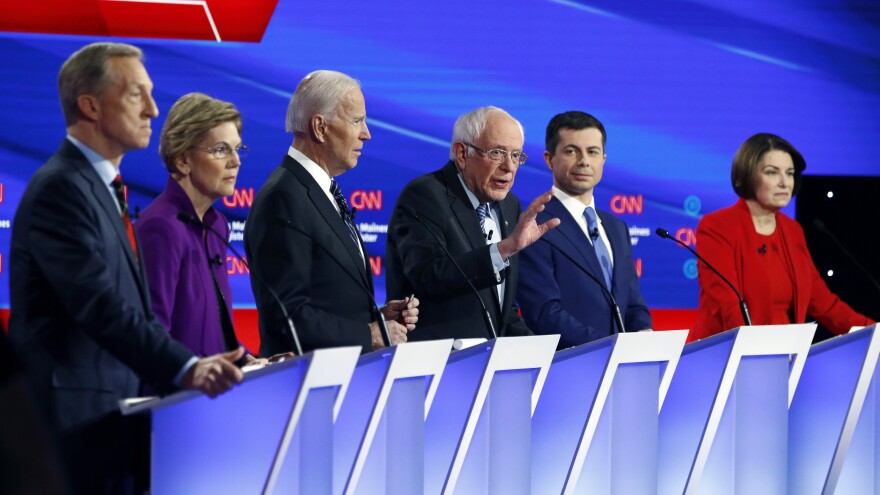After a flawed Iowa caucus process, the Senate acquittal of President Trump and a dramatic State of the Union address — all in the past five days — Friday night brings the eighth Democratic presidential debate.
Of the 11 candidates still running for president, only seven will take the debate stage in Manchester, N.H., tonight at 8 p.m. ET.
The debate comes a day after all the results finally came in from Iowa, but The Associated Press announced it was unable to officially declare a winner. That leaves a virtual tie in place between former South Bend, Ind., Mayor Pete Buttigieg and Vermont Sen. Bernie Sanders — with Buttigieg leading by 0.1% and Sanders holding more of the popular vote.
The delayed results dominated a sizable portion of the candidates' week leading up to Friday's debate. And unlike in previous election cycles, in which the winner of the Iowa caucuses takes the winning momentum into New Hampshire, the delays this year created an unprecedented feeling of collective victory among several major candidates.
Sanders in particular heads into the New Hampshire debate as a solid front-runner, fresh off a strong-but-delayed Iowa finish, $25 million raised in January alone and a sizable lead in the Granite State polls.
Specifically — according to the RealClearPolitics average — Sanders tops New Hampshire polls at 26%, followed by former Vice President Joe Biden (18%), Buttigieg (16%) and Massachusetts. Sen. Elizabeth Warren (14%).
Who will be onstage for the Feb. 7 debate?
The debate features seven candidates — one more candidate than last time — but still significantly less than the 20 featured in the first two sets of debates over the summer.
Loading...
Don't see the graphic above? Click here.
How to watch the debate:
The debate will begin at 8 p.m. ET and is expected to end around 11 p.m. ET. It is co-hosted by ABC News, Apple News and WMUR-TV and will take place at Saint Anselm College.
The debate will be televised on ABC, WMUR-TV and ABC affiliate channels. It can also be accessed on , the ABC mobile app, as well as TV streaming services Roku, Apple TV and Amazon Fire TV.
NPR's politics team will be providing live analysis and fact checks throughout the night at . Also, be sure to subscribe to The NPR Politics Podcast for a post-debate recap.
Who is moderating?
The debate is being moderated by ABC chief anchor George Stephanopoulos, ABC World News Tonightanchor David Muir and ABC News correspondent Linsey Davis. In addition, the ABC moderators will be joined by WMUR's Political Director Adam Sexton and anchor Monica Hernandez.
What has changed since the last debate on Jan. 14?
Jan. 16: The U.S-Mexico-Canada Trade Agreement passes in the Senate: The USMCA — a revised and updated version of the North American Free Trade Agreement — was passed in the Senate 89-10, marking a notable bipartisan moment in Congress and in the Trump administration. Trump signed it on Jan. 29.
Jan. 31: New advertising numbers show billionaire presidential candidates are massively outspending the rest of the field: Despite lower polling numbers, businessmen Michael Bloomberg and Tom Steyer have dropped over $446 million nationwide on advertising. The two candidates have outspent President Trump's reelection campaign significantly — which has spent $52 million on ads.
Feb. 3: Iowa caucuses: A reporting issue with a new app caused a major delay in results. As of Thursday evening, all precincts had finally reported, but no winner was declared. Sanders and Buttigieg essentially tied.
Feb. 4: President Trump delivers his State of the Union address: In his speech to Congress, Trump boasted about his administration's work to strengthen the economy, decrease the cost of health care, revamp immigration policy, and tighten national security efforts.
Feb. 5: President Trump is acquitted by the Senate: After months of an impeachment inquiry, a successful vote in the House of Representatives and a Senate trial, Trump was formally acquitted on two articles of impeachment Wednesday. The first article, abuse of power, received 48 guilty votes from Democrats and one Republican, Utah Sen. Mitt Romney. The second article, obstruction of Congress, was decided on a party-line vote.
Feb. 6: President Trump gives a televised speech post-acquittal: In the White House East Room, Trump gave a "victory" speech criticizing Democrats, the impeachment investigation and thanking his legal team and colleagues in Congress. "We went through hell, unfairly. I did nothing wrong," the president said, later describing the impeachment process as "bulls***."
Copyright 2020 NPR. To see more, visit https://www.npr.org. 9(MDAxMzY2MjQ0MDEyMzcyMDQ5MzBhZWU5NA001))




